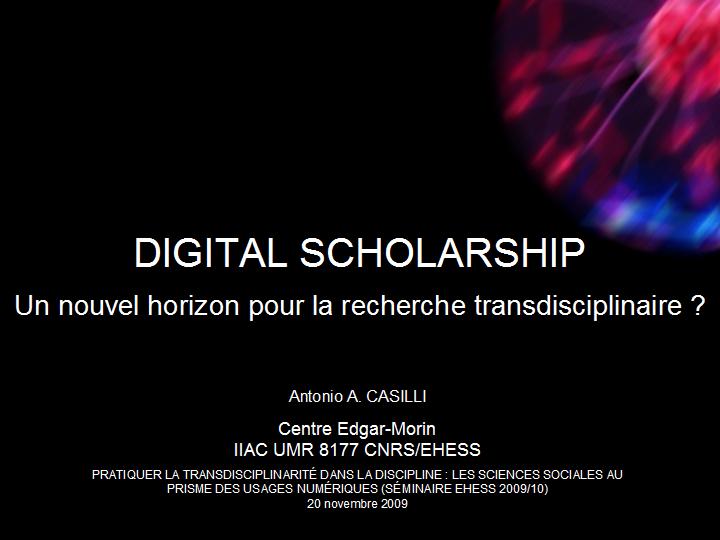Je reviens tout satisfait de mon séminaire Transdisciplinarité et numérique à l’EHESS (Paris) ! D’abord un énorme merci pour tou(te)s les étudiant(e)s et intervenant(e)s qui – par leurs remarques – ont créé un échange vraiment passionnant. Voilà tout de suite la version .pdf de ma présentation. Plus loin, vous trouvez aussi les références bibliographiques des articles cités au cours de la séance.
Les étudiants les chercheurs EHESS qui seraient intéressés à suivre les travaux du séminaire (surtout le wiki) peuvent s’inscrire ici : http://ent.ehess.fr. Il s’agit de l’adresse de Moodle, la plateforme d’enseignement de l’Ecole. Sur Moodle vous trouverez aussi tous les documents et les supports de cours de cette séance et les dates des prochaines séances. Pour connaître la clé d’accès au cours, n’hésitez pas à me la demander par le biais du formulaire Contact de ce blog.
Barreteau O. and F. Bousquet (2000). SHADOC: a Multi-agent Model to Tackle Viability of Irrigated Systems. Annals of Operations Research. No. 94: 139-162.
D’Aquino P., C. Le Page, F. Bousquet, A. Bah (2003). Using Self-designed Role-playing Games and a Multi-agent System to Empower a Local Decision-making Process for Land Use Management: the Self-Cormas Experiment in Senegal. Journal of Artificial Societies and Social Simulation. Vol. 6, No. 3. http://jasss.soc.surrey.ac.uk/6/3/5.html
Borgman, C. L. (2007). Scholarship in the Digital Age. Information, Infrastructure, and the Internet. Cambridge, MA: MIT Press.
Geller A. and S. Moss (2008). Growing Qawm: An Evidence-Driven Declarative Model of Afghan Power Structures. Advances in Complex Systems. Vol. 11, No. 2: 321-335.
Moretti S. (2002). Computer Simulation in Sociology: What Contribution? Social Science Computer Review. Vol. 20, No. 1: 43-57.
Nentwich, M. (2003). Cyberscience. Research in the Age of the Internet. Vienna: Austrian Academy of Sciences Press.
Obermeier, U., Barber, M. J., Krueger, A. and H. Brauckmann. (2009). Comparing University Organizational Units and Scientific Co-authorship Communities. http://arxiv.org/PS_cache/arxiv/pdf/0908/0908.4506v1.pdf
Small C. (1999). Finding an Invisible History: A Computer Simulation Experiment (in Virtual Polynesia). Journal of Artificial Societies and Social Simulation. Vol. 2, No. 3. http://www.soc.surrey.ac.uk/JASSS/2/3/6.html
Troitzsch K.G. (2004). Validating Simulation Models. In G. Horton (ed.), 18th European Simulation Multiconference. Networked Simulations and Simulation Networks. SCS Publishing House. 265-270. http://www.econ.iastate.edu/tesfatsi/EmpValidABM.Troitzsch.pdf
Tubaro, P & A. A.Casilli (2009) “An ethnographic seduction”: how qualitative research and Agent-based Models can Benefit Each Other. Bulletin de Méthodologie Sociologique, (en soumission)
